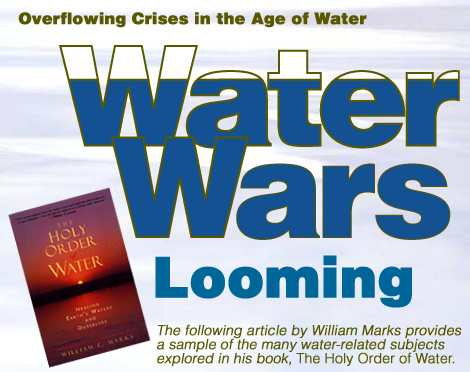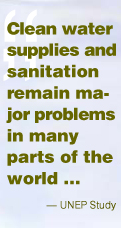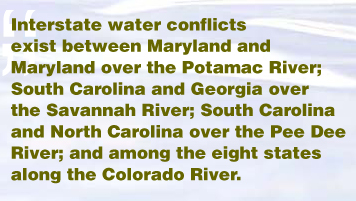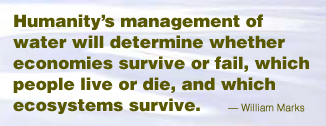

|
|

Sounding the AlarmThe year 2003 is designated by the United Nations as the “International Year of Freshwater.” In coordination with this designation, the United Nations Environment Programme (UNEP) released a report that provided an overview of the world’s freshwater resources and involved the input of more than 200 water experts from around the globe. According to this report, certain freshwater trends indicate an imminent water crisis; a crisis that will ultimately impact the survival of tens of billions of people, and place the foundation of civilization on a precarious footing. Item number five in the Executive Summary of the UNEP report states, “Clean water supplies and sanitation remain major problems in many parts of the world, with 20 percent of the global population lacking access to safe drinking water. Waterborne diseases from faecal [fecal] pollution of surface waters continue to be a major cause of illness in developing countries. Polluted water is estimated to affect the health of 1.2 billion people, and contributes to the death of 15 million children annually.” |

|
The fact that humans dominate and grossly transform Earth’s biosphere is supported by the above UNEP study as well as by other research. As expressed by Robert Kandel, in his book Water from Heaven, “Today, by way of agriculture, livestock, and forestry, humans appropriate more than a fourth of the world biosphere’s ‘net primary production,’ …” Or, to quote Pulitzer Prize-winning author, Edward O. Wilson, “…water is the deciding element on planet Earth. … The biosphere creates our special world anew every day, every minute …” Today, 450 million people in 29 countries suffer from water shortages. The fact that water use is rising twice as fast as population has led UNEP water experts to forecast that by year 2025 or sooner, “two out of every three people will live in water-stressed areas.” Two out of every three people translates to more than 4.5 billion people. The UNEP report also states that, “Agricultural water use accounts for about 75 percent of total global consumption, mainly through crop irrigation, while industrial use accounts for about 20 percent, and the remaining 5 percent is used for domestic purposes.” Battle Lines DrawnSince water is vital to life, shortages can foster severe crises including the following four categories of water wars: 1. The wars against polluted waters: Unsanitary waters cause more than 15 million deaths each year. This number of deaths will probably escalate with population increase and potable water shortages. If a climatic phase of severe drought strikes, the present 15 million deaths per year could rise to more than 25 million deaths per year. 2. The wars for entrepreneurial control: These wars are evidenced by transnational corporations purchasing water companies and resources around the world. Since these companies are in business for profit, once they have a monopoly on a system the price of water usually escalates. For example, in the years following the privatization of water services in Britain, the price for water increased an average of 67 percent and in some areas up to 450 percent. People who couldn’t afford to pay their bills had their water shut off. This resulted in a sixfold increase of dysentery. On a similar note in South Africa in 2000, after privatization, water prices were greatly increased. Due to an inequitable pricing, wealthy sections received quantity discounts, while poor sections paid up to twice as much. When water was shut off for nonpayment, many poor people had no choice but to obtain their water from polluted rivers. This resulted in one of the worst cholera epidemics in modern history. 3. The legal wars: These wars are fought in courts and in political offices — albeit sometimes in the back room. One example in the United States is the present fight between Maryland and Virginia. As reported in The New York Times on March 3, 2003, “Back in 1632, King Charles I granted Maryland the right to the Potomac River ‘from shore to shore.’” This grant provides the legal basis for Maryland’s control over the Potomac’s water. Maryland’s control is now being contested by Virginia. Due to overpumping of its groundwater and the recent drought drying up its surface waters, Virginia thirsts for Potomac River water. 
Other interstate water conflicts exist between South Carolina and Georgia over the Savannah River; South Carolina and North Carolina over the Pee Dee River; and among the eight states along the Colorado River. The list of interstate legal battles grows longer each year. Also, there are challenges over the water flowing from the U.S. to Mexico, from the Rio Grande and Colorado rivers. In order to fulfill its treaty to deliver quantities of suitable water to Mexico, the U.S. has built one of the world’s largest desalination plants in Yuma, Ariz. The water battlegrounds extend even to nuclear power plants. These plants intake huge quantities of cooling water from rivers. During the U.S. drought of 2002, several nuclear plants came close to shutting down due to lack of water. If a nuclear power plant was built prior to other downstream power plants, it could argue historic and first-use rights. Other special claims to water involve ranchers, cities, factories, farmers, miners and recreational interests such as golf and tourist destinations. And, finally, there is the important legal argument of providing water for ecosystem preservation. 4. The wars fought with weapons: Whoever has the most money and the biggest guns will probably win the battle — but not the war. The Jordan River watershed flows through Israel, Syria, Lebanon and Jordan. Israel does its best to exercise control over most of the Jordan River and its upstream tributaries. Recently, Lebanon set up a pumping station and began pumping water from a section of the Wazzani River within its borders. The Wazzani is an upstream tributary of the Jordan River. Israel has threatened war. The U.S. is mediating to help prevent a conflict. Israel is also exploring desalination, a pipeline from Turkey and towing Turkish water in huge bags across the Mediterranean. Africa’s Nile River is more than 4,238 miles long and flows through 10 water-starved countries. Egypt, sitting at the end of the river, claims water rights based on its ancient usage. It has warned the other nine countries that any construction of an upstream dam would be considered an “act of war.” Turkey sits at the headwaters of the Tigris and Euphrates rivers. Downstream are Syria and Iraq. Until recently, there had been little conflict. Now, Turkey is building 22 large dams with reservoirs to provide electric power, irrigation and drinking water. The Future Is NowHumanity has arrived at the “Age of Water.” If civilization as we know it is going to survive, an unprecedented phase of human cooperation is needed. This will center on our “awakening” to water. Humanity’s management of water will determine whether economies survive or fail, which people live or die, and which ecosystems survive. 
Of all life forms, humans alone divert and use water for purposes contrary to the support of life. Things like golf courses, water parks and ski resorts are just three examples of wasting water that otherwise could be used for growing food, recharging groundwater or helping ecosystems survive. Modern humans have grown accustomed to technology coming to the rescue. Desalination of ocean water is often presented as a potential solution (see “Is Desalination the Answer?”). But to desalinate and transport ocean water takes a tremendous amount of energy. The replacement and maintenance of the equipment is costly, and large quantities of waste are produced that can damage ecosystems. The same problems exist with filtering polluted river waters. To address the challenge of limited water and to ensure the future prosperity of civilization, our collective behavior must be consciously directed at working with water in support of life. It would be wise for our own individual health and that of the planet for us to take a little time to learn about water and how we can help preserve it. In essence, the future of life on Earth will be determined by humanity’s choices involving water. We will soon find out if humankind is up to the task. |
|
Raising Awareness of Water’s Worth | Is Desalination the Answer? FDU Magazine Directory | Table of Contents | FDU Home Page | Alumni Home Page | Comments |
|